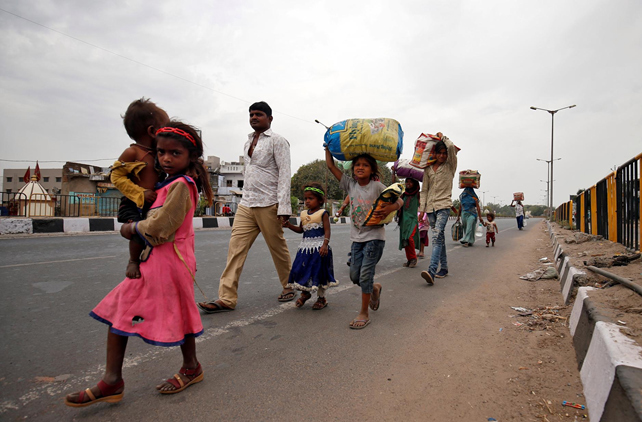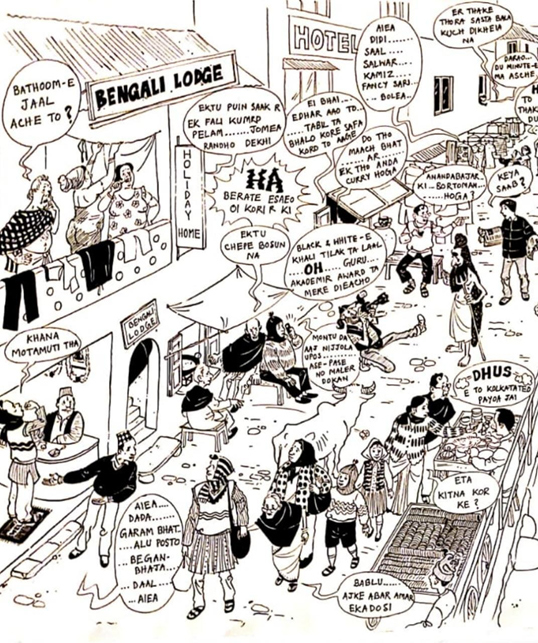‘To be, or not to be’ is a deeply philosophical question that intrigued Hamlet, Prince of Denmark in William Shakespeare’s eponymous tragedy. A similar dilemma stares denizens of the Covid-19 infested global community — right there in the face. To travel, or not to travel — an issue that may have less to do with epistemological musings but definitely with existential imperatives.
In a self-quarantined universe any kind of human concourse has been literally abandoned. Leave alone moon landings and mars missions, rail stations and airports, bus terminuses and cab stations are all sealed off and ‘Not a creature was stirring, not even a mouse’.

Sanitised and disinfected spaces sport a deserted look that makes isolation the name of the game. A lone sentinel keeps guard that the battle lines are indelibly drawn and none ( though one is never sure of the virus itself) can infiltrate into what were, not so long ago, hubs of human mobility.
Travel advisories the world over have ruled out international hobnobbing even for purposes of business in corporate circuits or for exchange of research and knowledge in academia. The current scenario is encouraging virtual meetings over Zoom and Skype that rules out travel and commuting. Webinars have become the order of the day and institutions and organisations are jumping on to the bandwagon cutting out any form of direct encounters that may play havoc with the newly formulated norm of social distancing.
So how do travel businesses, airlines and tour companies handle this unforeseen and unprecedented lock-down? Several airline companies in India have been pulled up for not refunding money to passengers who had to cancel tickets due to the suspension of flights, both domestic and international, since late March 2020. Some others have been given warnings for having announced new passenger bookings even before the central government has lifted the ban on travel.
However one wonders who these die-hard prospective passengers could be, bitten by the wander-lust bug. Or are these people stuck in places of work hankering to be home with family in these times of pandemic? Exiled individuals attempting to make their heroic journey homewards like Odysseus, ignoring the dangers of the journey.
Just as the digital divide is becoming markedly visible in these days of virtual learning, classrooms and communication, patterns of movement have thrown up news and visuals of rural India’s migrant workers caught unawares without work and therefore without food in the cities and urban centres of India. Pangs of hunger, tales of employer’s neglect, travails of marginalisation have compelled them to walk back over hundreds of kilometres, across state borders to reach their village homes. Police action has put them behind bars or led to punitive measures for having broken restrictions and taboos; such migrants have been even forcibly crowded into quarantine camps. Trudging along highways without food and water has caused not just hardship but death for several of these courageous pedestrians on a marathon homeward expedition. These people constitute the nation’s backbone, its grass root level workforce, its senior citizens as also a young populace, future citizens who are yet to come of age in an India to which they belong.

In the pre- Covid world, travel did not refer only to tourism, travel referred to any form of spatial displacement within the context of a specific temporal span. Just as exploratory voyages and maritime trade were considered forms of travel, other manners of journeying and movement on land, including negotiating the rugged terrains and passes in caravans, on mule, camel or horseback along the famed silk route took humans to new places, different cultures, alien ethnicities.
Is Francis Bacon’s maxim in his essay “Of Travel”, widely emulated and followed over centuries that stipulated — “Travel, in the younger sort, is a part of education, in the elder, a part of experience. He that travelleth into a country, before he hath some entrance into the language, goeth to school, and not to travel” — likely to take a double somersault? The motto today being ‘Stay Home, Stay Safe’.
Travel and tourism is a global industry that seems to be gravely compromised now. When it does pick up in the Post- Covid world it is anybody’s guess how things will change. Until the corona vaccine is in place, travel, when the shutdown eases will be severely limited to necessary travel. Patterns of travel are likely to be revolutionised as well as the conditions of travel by air and rail which will need to take corona precautions by modifying seating, strengthening hygiene and ensuring extreme safety measures. The daily commute is likely to be drastically modified with more of work from home options being offered to regular office goers. A paradigm shift in the concept of who travels, why one travels and where one travels will necessarily modify the global perspective of the industry. Leisure travel will be hit badly and the peripatetic Bengali traveller, so ubiquitously present in all tourist destinations on pre-Puja and post-Puja sojourns will reluctantly settle down to life in a ‘home sweet home’. The excitement of being the identifiable Bengali traveller at a tourist destination, so humorously captured in the cartoon below, will become a much cherished memory, experiences that dreams are made of!

Visited 1684 times, 2 Visits today


